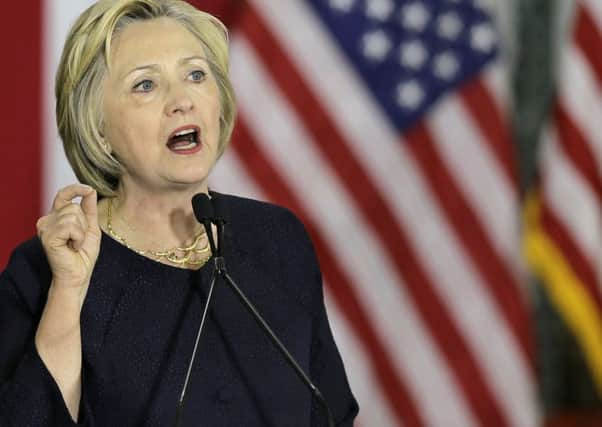Hillary Clinton - do we have the right to know about the health of our political leaders?


Even before Hillary Clinton’s campaign revealed that the Democratic presidential nominee had been diagnosed with pneumonia, questions were being asked about her state of health.
In a matter of weeks this went from spurious chatter on social media, to her presidential rival Donald Trump claiming she lacked the “mental and physical stamina” to take on America’s adversaries.
Advertisement
Hide AdAdvertisement
Hide AdAfter she appeared to stumble and was helped into a vehicle following a 9/11 ceremony speculation about her health went into overdrive with the hashtag #HillaryHealth trending on Twitter. A planned campaign trip to California was cancelled and a statement was issued saying Clinton was “recovering nicely”.
Concerns about the 68-year-old’s health have repeatedly resurfaced after she suffered a blood clot in 2012, despite her doctor saying she had made a full recovery. But this latest incident has made the health of presidential candidates a major talking point with Trump, 70, now saying he plans to release his own health report.
Professor Matthew Flinders, Director of the Sir Bernard Crick Centre at the University of Sheffield, believes we have a right to question the health of our political leaders.
“The pressure, both physical and mental, of modern leadership is so intense that you almost need to be a superman or superwoman cope with it,” he says. “The public wants politicians to be normal and normal people get ill, so the fact that she (Clinton) was taken ill could help her because it shows she’s human.”
Advertisement
Hide AdAdvertisement
Hide AdHowever, he believes her illness has attracted wider coverage because she’s a woman. “This is less about Hillary Clinton and more about the masculine nature of politics. I don’t think if this had been a male candidate it would have received so much attention,” he says. “I think there’s a latent sexism here – a man can be president but a woman has to prove herself.”
This isn’t the first time the health of prospective candidates has been on the agenda. In 2008, Barack Obama’s doctor made a detailed report about him available, while John McCain, who had survived several brushes with skin cancer, made large swathes of his medical history available.
But political leaders haven’t always been so forthcoming. In the past, health issues were seen as taboo subjects for the media with most presidents and candidates keeping their medical history private, and the public in the dark.
Woodrow Wilson suffered several strokes in the years before he was elected but never publicly disclosed the information. With Franklin D. Roosevelt, the public knew of his battle with polio but it later emerged that he withheld an even graver medical condition.
Advertisement
Hide AdAdvertisement
Hide AdBy January 1945, as he was being sworn in for a record fourth time, he was already suffering from severe hypertension and arteriosclerosis. He died three months later.
It’s not only across the Pond where health issues were kept under wraps. In 1953, two years after winning a general election, Winston Churchill was left partially paralysed after suffering a stroke which government officials and the press colluded in concealing.
We no longer live in such deferential times and the level of public and private scrutiny of our would-be political leaders has never been greater. It’s hard to imagine Roosevelt of Churchill putting up with such intrusion into their lives which raises concerns about the kind of leaders we want.
“The risk is you create a system where only people with the skin of a rhinoceros enter politics – people who never get ill and don’t have any skeletons in the cupboard,” says Prof Flinders. The question is are they necessarily the best people for the job?